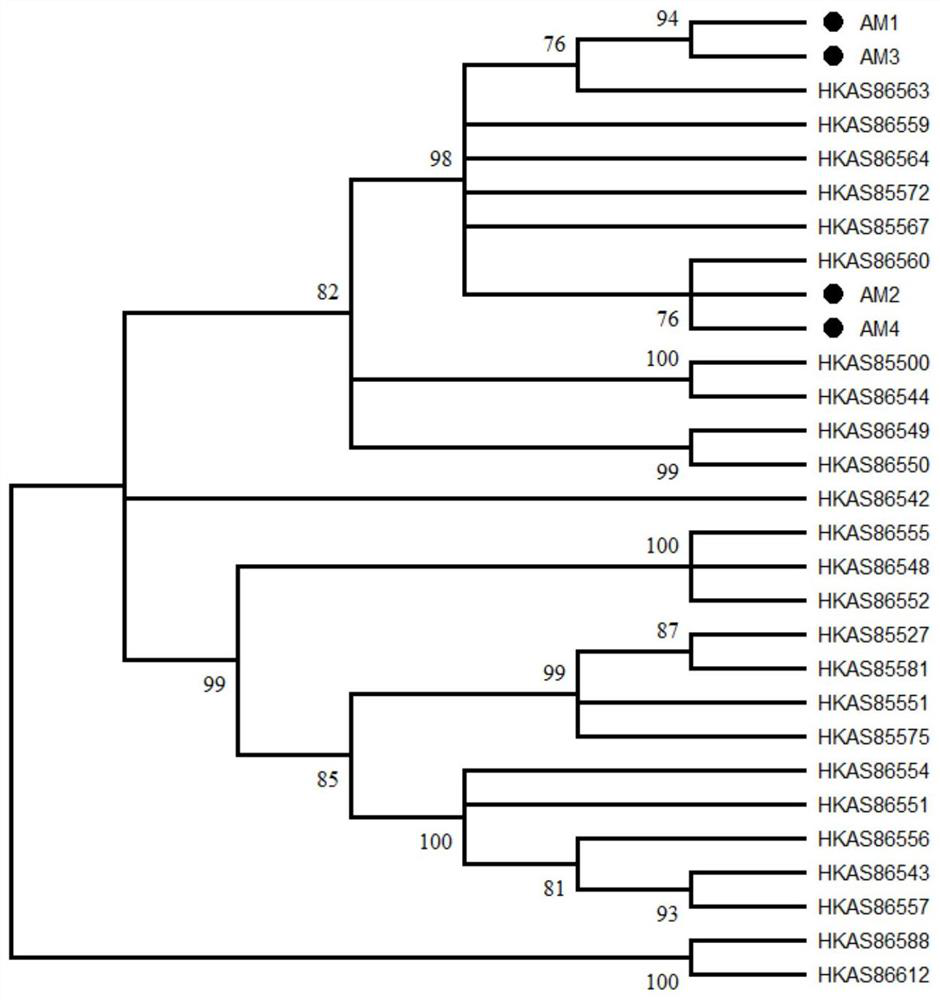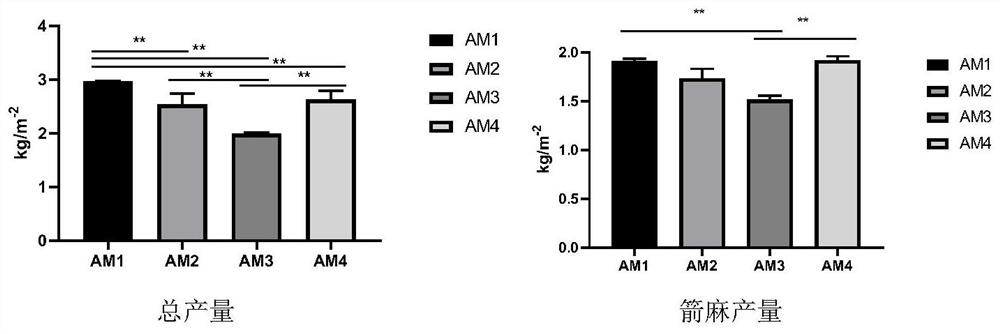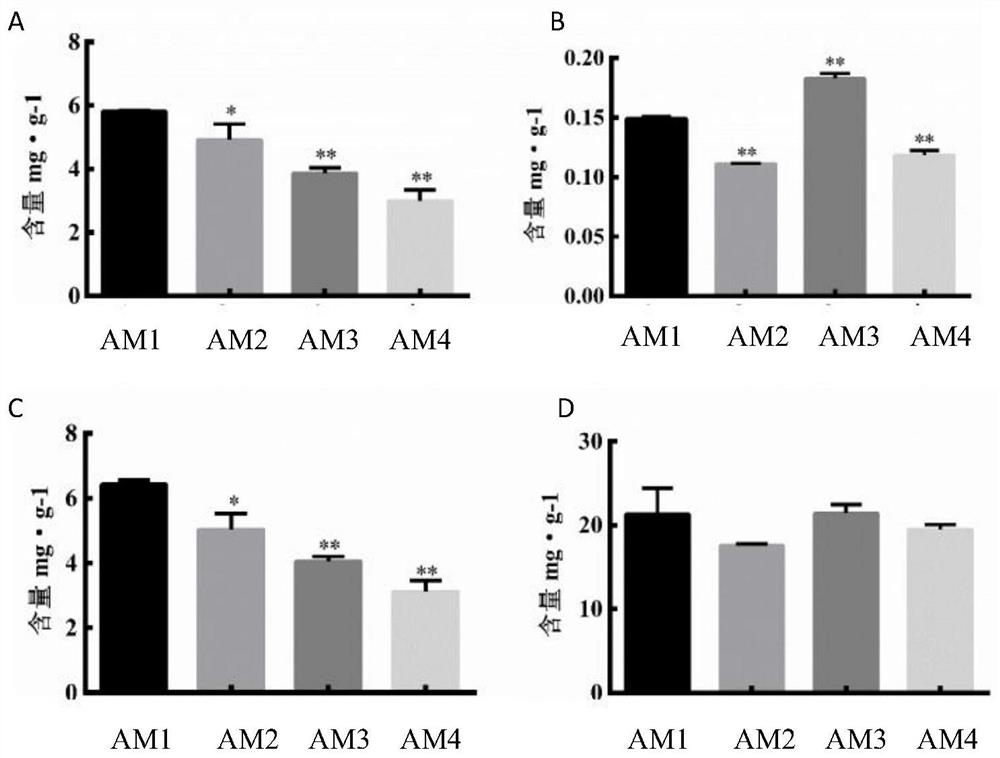Armillaria Armillaria Xiaocaoba No.1 and Its Application in Cultivation of Gastrodia elata
A technology of Armillaria armillaria and Gastrodia elata, applied in the field of new strains of Armillaria armillaria, which can solve the problems of production confusion, differences, and rotten hemp of Armillaria armillaria strains
- Summary
- Abstract
- Description
- Claims
- Application Information
AI Technical Summary
Problems solved by technology
Method used
Image
Examples
Embodiment 1
[0022] The acquisition of embodiment 1 bacterial strain, strain identification
[0023] 1.1 Strain isolation
[0024] Two strains of Armillaria armillaria were isolated from wild Gastrodia elata (gastrodia elata tubers with fungal cords) in Xiaocaoba Town, Yiliang County, Yunnan Province, numbered AM1 and AM4. The specific separation method is as follows:
[0025] Wash the soil on Gastrodia elata with clean water, rinse with sterile water 3 times after running tap water for 15 minutes, soak in 0.1% mercuric solution for 1-2 minutes, rinse with sterile water 2-3 times, remove residual disinfectant, and then use sterile Cut out the required part of the tissue with a sterile knife and place it in a sterile petri dish, absorb the surface moisture with sterile filter paper, put it on a petri dish with PDA medium added with chloramphenicol, and start cultivating at a constant temperature of 25°C for 5 days Grow new strands.
[0026] The morphological characteristics of the above-...
Embodiment 2
[0043] Embodiment 2 Gastrodia elata cultivation test
[0044] This example examines the influence of French Armillaria gallica Xiaocaoba No. 1 (CGMCC No. 16781) on the yield and quality of Gastrodia elata as companion planting. For ease of description, the strain is still coded as AM1.
[0045] Taking Armillaria AM2, AM3, and AM4 described in Example 1 as controls, the above four strains were subjected to the concomitant planting experiment of Gastrodia elata.
[0046] Source of Gastrodia elata planting: the first generation of Gastrodia elata locally produced in Xiaocaoba, Yiliang County; cultivation location: Gastrodia elata demonstration garden in Xiaocaoba, 2010m above sea level, 104°12′2″E, 27°45′21″N. The cultivation method of "three nests" is adopted, that is, the method of placing the cultivation holes at the same time by using tree sticks, different Armillaria strains, and Gastrodia elata seeds, and the cultivation was carried out on March 20, 2017; the cultivation h...
Embodiment 3
[0053] Embodiment 3 Biological properties compare
[0054] This example examines the biological properties of Armillaria gallica Xiaocaoba No. 1 (CGMCC No. 16781). For ease of description, the strain is still coded as AM1.
[0055] Armillaria AM2 described in Example 1 was used as a control.
[0056] The improved solid PDA medium was quantitatively inoculated with young fungal cords of strains AM1 and AM2, cultured in the dark at 25°C, and the experimental data were regularly observed and recorded.
[0057] Determination of growth
[0058] From the fourth day of inoculation, the growth amount of the strain was measured by the cross method, and was measured every day until it was overgrown.
[0059] Extracellular enzyme activity assay
[0060] Preparation of crude enzyme solution
[0061] Fill a 2.0mL centrifuge tube with the culture medium around the mycelium at random with an inoculation needle, centrifuge at 12000r / min for 15min, suck out 1mL of the supernatant and dist...
PUM
 Login to View More
Login to View More Abstract
Description
Claims
Application Information
 Login to View More
Login to View More - R&D Engineer
- R&D Manager
- IP Professional
- Industry Leading Data Capabilities
- Powerful AI technology
- Patent DNA Extraction
Browse by: Latest US Patents, China's latest patents, Technical Efficacy Thesaurus, Application Domain, Technology Topic, Popular Technical Reports.
© 2024 PatSnap. All rights reserved.Legal|Privacy policy|Modern Slavery Act Transparency Statement|Sitemap|About US| Contact US: help@patsnap.com










